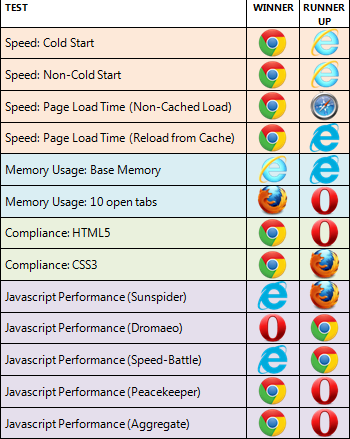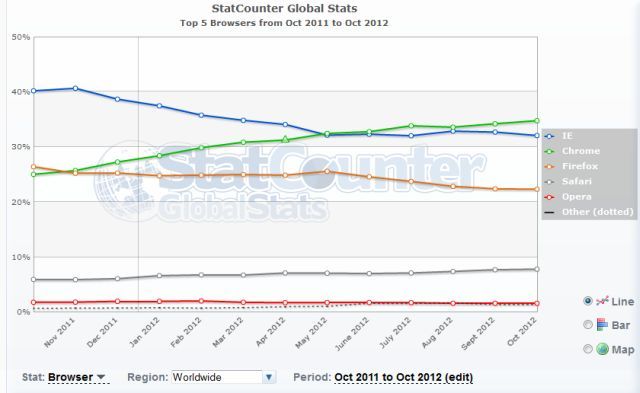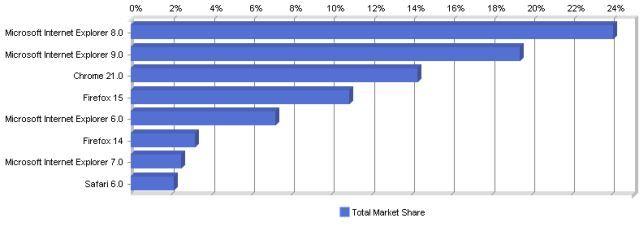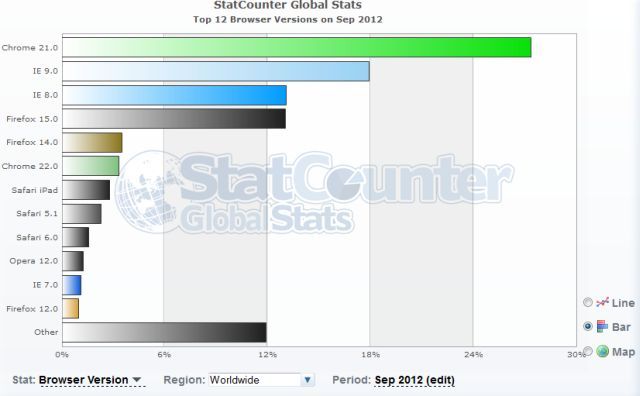Well, it’s a new year, so here’s what’s been happening in the world of the web browser since our last update…
- Internet Explorer – Microsoft’s self-proclaimed comeback – has IE really “grown up”?
- Chrome – v24 out now, v25 around the corner – with voice control!?
- Firefox – 64-bit development fiasco, but “Junior” for iPad and Firefox OS on their way!
- Safari – It’s oh so quiet! Shhhh…
- Opera – Continuing to improve stability and security… plus a new Android and iOS browser coming, and a possible move to WebKit?
Internet Explorer:

At the tail end of 2012, Microsoft released a video on YouTube touting the comeback of its Internet Explorer browser. The video focuses on how people “love to hate” Internet Explorer. In the video, an individual is depicted trolling news stories, videos and Twitter accounts about how much Microsoft’s browser “sucks”.
The video ends by the troll typing “IE sucks… less,” after which Microsoft proclaims “progress” is being made and that “comebacks come in many shapes and sizes.”
Following that, the video mentions Microsoft’s new website to promote the campaign, TheBrowserYouLovedToHate.com.
Now, Microsoft’s IE “comeback” campaign is gathering more pace. By specifically targeting those who grew up in the 1990’s, and using the Twitter hashtag “#childofthe90s”, Microsoft are flooding the social network with a host of photographs of 90’s children’s toys with the tag line “You grew up. So did we. Reconnect with the new IE“
It’s all well and good Microsoft promoting that IE has made a “comeback”… but has IE really grown up?
Their latest incarnation is Internet Explorer 10. This is available for Windows 8, and currently as a IE 10 “Preview” for Windows 7. Back in November, we put IE10 “head-to-head” with the other current browser offerings from Mozilla, Google, Apple, and Opera software. You can read our full test report and conclusions here, and you’ll see that IE10 performance was rather disappointing!
So has Internet Explorer “grown up”? Well, in comparison to earlier versions of IE – yes. Yet in comparison to the latest offerings from the other major browser vendors, Internet Explorer still has a LOT of growing up to do!
For us to be convinced that their flagship browser has truly “made a comeback”, Microsoft’s will need to ensure that they now maintain and update IE on a more frequent basis, as all the other major browsers do! …otherwise this self-proclaimed “comeback” will be short-lived!
Months, or in IE’s case – years – between major browser updates really doesn’t cut it in the highly competitive – and ever evolving – browser market we’re in today!
MIDAS is currently supported in Internet Explorer 8+ (v10+ recommended)
Google Chrome:

Earlier this month, Google pushed an update to their Chrome browser, bringing the version number up to 24. Google’s main claim with this new version is that performance has improved “26.3% since Chrome 15”.
Now, Chrome 15 may seem like seem it was released a long time ago. In actual fact it was less than a year ago that Chrome 15 was the “latest” offering of Chrome!
If you’re a regular follower of our blog, you’ll know there’s been a whole version number supremacy battle going on between browser vendors in recent times! In a blog post, Google justify their “rapid release schedule” and lack of noticeable “new features” in Chrome 24 by saying “What you may not know is that things are changing under the hood every six weeks, thanks to auto-update. It’s like a mechanic stopping by every six weeks to give your car a new engine”
So whilst v24 may have lacked in the way of “new features”, v25 promises to have support for the new and emerging “Web Speech API”. This may ultimately allow websites, and web apps – such as our own Room Scheduling System – to be voice controlled! …which is quite exciting, and ever so slightly reminiscent of this scene from Star Trek IV…

In other Chrome news; if you’ve got an Android smartphone, did you know that you can get the Google Chrome browser for your mobile device?! …well, only if your device runs Android 4.0+, which is a shame, given that mobile versions of both Opera and Firefox are currently available for earlier Android devices.
MIDAS is currently supported in Chrome 9+ (v24+ recommended)
Mozilla Firefox:

Mozilla seem to be loosing a bit of direction of late! Back in November, we reported on a number of setbacks for Firefox. Including a major update that was subsequently withdrawn, a large fine imposed by the EU, and a drop in market share.
Well, since then, there’s been more controversy! Mozilla announced that they would no longer be developing a 64-bit Windows version of Firefox.
Mozilla Engineering Manager Benjamin Smedberg made the decision to kill off development. He outlined his view on the matter in a post titled “Turn off win64 builds” on a Google Groups development board. Smedberg blames the decision partly due to 3rd party plugins, commenting “Many plugins are not available in 64-bit versions.”
However, following a backlash by users, his decision was subsequently reversed.
In a later post on the Mozilla Google Groups support page, Smedberg admitted that “there was significant negative feedback” on the move to cancel 64-bit development of Firefox. After his change of heart, he then claimed “I believe that we can keep a set of users happy by making a modification to the original plan“. This plan essentially involved moving all users of 64-bit builds of Firefox back to the 32-bit channel, and then having those users manually download a new 64-bit build.
Aside from the 64-bit Firefox fiasco, Mozilla have recently announced a number of other projects they have in the pipeline. Namely, a new web browser “built from the ground up” for the iPad, called “Junior” (expected in the first half of 2013). Interestingly, Junior will use WebKit layout rendering (also used by Chrome & Safari), rather than Mozilla’s own “Gecko” rendering. This may however be a restriction imposed by Apple, rather than by choice.
Plus, Mozilla have been working on their own mobile operating system, “Firefox OS”, with developer preview phones now available!
Will Firefox OS have any impact on the mobile os market?
With iOS, Android, and Windows Phone being the key players, Firefox OS will have a hard job taking a significant market share! Many mobile phone providers have tried to launch their own proprietary operating systems before and failed. So it remains to be seen exactly what impact Firefox OS will have!
MIDAS is currently supported in Firefox 4+ (v18+ recommended)
Safari:

Sadly, there’s just no new Safari news to report this time! As you’ll know from our last update, Safari development seems to have taken a back seat at Apple in recent times. Apple are seemingly more focused on their hardware offerings, than on their web browser. In fact, as we reported, they’ve ceased development on the Windows version of Safari. Perhaps they feel they can no longer compete with the likes of Internet Explorer, Firefox and Chrome and prefer to stick with an operating system where Safari has the monopoly.
However, with a version of Firefox soon to become available to iPad users, Safari’s dominance on iOS may soon be in jeopardy. This might actually be a good thing, as it may drive Apple to further develop Safari!
MIDAS is currently supported in Safari 4+ (v5+ recommended)
Opera:

Whilst the other major browser vendors had a bit of a break over Christmas, it seems like development over at Opera continued at a pace! Since we last reported on Opera, version 12.11 was released in late November. 12.12 was released just a few days before Christmas, and now 12.13 looks set for imminent release in the next couple of days.
There’s nothing major to report on these releases. They primarily just contain “stability and security improvements”. But it’s good that Opera are commitment to the continued improvement of their desktop browser even during the festive period.
It doesn’t end there though. Opera are pushing forward with their various other browser offerings. Their latest project, “Ice”, will see a minimalist browser being introduced for both Android and iOS devices.
According to Opera’s CEO, “Ice” is “a reboot of your average web browser, it has no buttons, no menus, and all you see is content … Everything is gesture based and that’s what Opera is all about.“
What’s interesting is that Opera will drop their own “Presto” layout rendering engine, and instead use WebKit rendering for “Ice”. There’s no word yet whether this move will ultimately mean that “Presto” is also phased out of their desktop browser as well.
In many respects, this would be a good move from our point of view. As a developer, as it would certainly simplify development somewhat!
We always ensure that our browser based scheduling solution runs smoothly in the 5 major browsers. This means we have to make sure that MIDAS looks as close to identical as possible regardless of which browser you use. At present, different browsers use different “rendering” (or “layout”) engines. This is how a browser interprets the code that goes to make up a web page (or web app) and subsequently displays (“renders”) it to your screen.
At present there are 4 main browser layout/rendering engines:
- “Trident” – Used by Internet Explorer
- “Gecko” – Used by Firefox
- “WebKit” – Used by Chrome and Safari
- “Presto” – Used by Opera
Both Chrome and Safari use the same rendering engine. In theory web pages (and apps) should look identical in both browser. In practice this isn’t quite true, as each browser is updated on a different release cycle. As such, new features of the WebKit engine make it into sooner into one browser than the other. But if Opera also make the switch to WebKit at some point, in theory, sites/apps should look identical in Chrome, Safari AND Opera.
MIDAS is currently supported in Opera 9+ (v12+ recommended)
 As a New Year is an ideal time to make a fresh start with your room bookings. To celebrate the start 2013 we’re offering 13% off new purchases of our web based software throughout January! – simply use Promo Code “NEWYEAR13” on our website when making your purchase.
As a New Year is an ideal time to make a fresh start with your room bookings. To celebrate the start 2013 we’re offering 13% off new purchases of our web based software throughout January! – simply use Promo Code “NEWYEAR13” on our website when making your purchase.








 Google have
Google have  Still somewhat on the subject of Internet Explorer – opinion continues to be divided as to which browser – Internet Explorer or Google Chrome is currently the most widely used browser in the world. It all depends on who you talk to!
Still somewhat on the subject of Internet Explorer – opinion continues to be divided as to which browser – Internet Explorer or Google Chrome is currently the most widely used browser in the world. It all depends on who you talk to!

 The Opera name has been with the browser since the very beginning. In fact, Opera v1 was first released back in 1994. Often overlooked, this well established browser has retained a small, but loyal following over the years. Although historically not enjoying the same user growth as other browsers have, for the last year or so, development work on Opera has really gathered pace! Opera software have been regularly putting out developer snapshots and beta builds – sometimes several times a week! All this work culminated with the
The Opera name has been with the browser since the very beginning. In fact, Opera v1 was first released back in 1994. Often overlooked, this well established browser has retained a small, but loyal following over the years. Although historically not enjoying the same user growth as other browsers have, for the last year or so, development work on Opera has really gathered pace! Opera software have been regularly putting out developer snapshots and beta builds – sometimes several times a week! All this work culminated with the